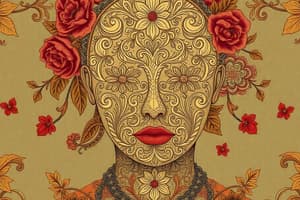Podcast
Questions and Answers
Which philosopher is known for the theory of psychosexual development?
Which philosopher is known for the theory of psychosexual development?
- David Hume
- Immanuel Kant
- Sigmund Freud (correct)
- John Locke
What does Freud's idea of the self emphasize?
What does Freud's idea of the self emphasize?
- The physical structure of the brain
- The separation of conscious and unconscious processes
- The purely rational decision-making processes
- The interaction between societal standards and unconscious wants (correct)
According to Gilbert Ryle, how is the self conceptualized?
According to Gilbert Ryle, how is the self conceptualized?
- As a construct of societal beliefs
- As a unique spiritual entity
- As an illusion of human consciousness
- As a product of brain activity (correct)
What connection does Maurice Merleau-Ponty make concerning the self?
What connection does Maurice Merleau-Ponty make concerning the self?
What aspect of the self did St. Augustine primarily focus on?
What aspect of the self did St. Augustine primarily focus on?
Flashcards are hidden until you start studying
Study Notes
Philosophical Perspectives on Self
- Socrates emphasized self-examination and the idea that understanding oneself is crucial for meaningful living.
- Plato proposed that the self is composed of three parts: rational, spirited, and appetitive, contributing to the ideal of justice and harmony.
- Aristotle regarded the self as a rational being, highlighting the importance of reason and virtue in achieving eudaimonia (flourishing or happiness).
- St. Augustine introduced a theological dimension, asserting that the self is intimately connected to God and influenced by divine grace.
- René Descartes famously posited "Cogito, ergo sum" (I think, therefore I am), linking self-awareness with existence and underlining doubt as a pathway to certainty.
- John Locke advanced the concept of self through memory, suggesting personal identity is formed by continuous consciousness.
- David Hume challenged the notion of a fixed self, arguing that the self is merely a collection of perceptions without a stable essence.
- Immanuel Kant proposed that the self is a synthesis of experiences, mediating between the sensory world and rational thought.
Sigmund Freud’s Theories of Self
- Freud described the structure of personality as composed of the id, ego, and superego, each representing different aspects of human behavior and motivation.
- His theory of personality dynamics explores the interplay between conscious thought, unconscious desires, and societal norms.
- Freud’s theory of psychosexual development outlines stages of personality formation, emphasizing the impact of early life experiences on adult behavior.
Alternative Philosophical Views
- Gilbert Ryle critiqued Cartesian dualism and proposed that self is better understood as a collection of behaviors rather than a separate entity.
- Paul Churchland, a Canadian philosopher, focused on neurophilosophy, contending that the self results from brain activity and is not an independent concept.
- Maurice Merleau-Ponty emphasized the embodied nature of self, suggesting that one's sense of self is shaped by physical and sensory experiences.
Studying That Suits You
Use AI to generate personalized quizzes and flashcards to suit your learning preferences.




